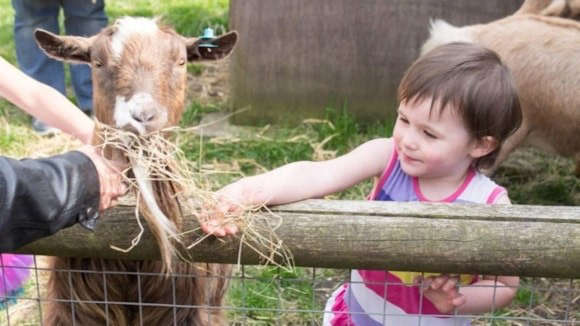
As the Easter holidays approach, the UK Health Security Agency (UKHSA) East Midlands is reminding everyone how to stay safe when coming into contact with farm animals this Spring.
Farm visits can be fun and educational for all the family, but germs and bad bugs can ruin a fun day out.
As the temperatures increase and visitors flock to outdoor attractions, there is typically a rise in gastro-intestinal infections such as Cryptosporidium and E.coli, which are often linked with outdoor activities such as farm visits.
UKHSA is urging families in the East Midlands who might be planning a trip to the farm, to remember the importance of thoroughly washing hands after touching animals, fences and other surfaces before eating food or touching their face to avoid getting bugs, which can make them seriously ill.
Last year, UKHSA investigated 16 outbreaks of cryptosporidium nationally linked to farm visits, which resulted in many hundreds of infections.
Dr Jharna Kumbang, Consultant in Communicable Disease Control at UKHSA East Midlands, said: “Visiting a farm is a really fun day out, which is an enjoyable and educational experience for many people, particularly children. However, it carries a small risk of catching infections from animals or the environment. Farm animals can be the source of several bugs that can be passed from animals to humans and cause illness. Some can be particularly serious for children or pregnant women.
“Infections can be picked up from the animal’s body, its poo or from areas where animals have recently been. If the germs are on your hands, you could accidentally pass them to your mouth. You can’t see the germs, so your hands may appear clean.
“Washing your hands thoroughly with soap and warm water immediately after you have had contact with animals and before eating food will reduce the risk of infection. Do not use gels or wipes instead of soap and water - they do not remove bugs in dirt.”
What to do when visiting a farm
Following the simple rules listed below will help to keep you and your children safe from infections that may be found on open farms. Pregnant women need to take particular care as infections acquired from animals can be harmful to them and their unborn baby.
- Do wash your hands thoroughly with soap and water, and dry them, after you have touched animals, fences or other surfaces in animal areas. All open farms provide handwashing facilities for visitors.
- Do wash your hands thoroughly with soap and water, and dry them, before eating or drinking.
- Do remove and clean boots or shoes that might have become soiled and clean pushchair wheels. Then wash your hands thoroughly with soap and water, and dry them.
- Do supervise children closely to ensure that they wash their hands thoroughly.
- Washing your hands should take about 20 seconds – the same time that it takes to recite a single verse of “Old Macdonald Had a Farm”.
- Do eat and drink in picnic areas or cafes only.
- Do not put hands on faces or fingers in mouths while petting animals or walking round the farm.
- Do not allow children to put their faces close to animals.
- Do not eat or drink while touching animals or walking round the farm.
- Do not eat anything that has fallen on the floor.
- Do not use gels or wipes instead of washing hands with soap and water. Gels and wipes do not remove bugs in dirt.
Annabel Shackleton, Open Farm Sunday Manager at LEAF (Linking Environment and Farming) said: “Visiting a farm is not only a fantastic experience, it’s educational too. We want people to continue to safely visit farms and the countryside. So, straight after touching animals and pens or fencing, everyone must wash their hands thoroughly with soap and clean running water, and dry them. Adults should always supervise children to ensure that they wash their hands properly and grow up learning that clean hands are essential, especially before eating.”
What should I do if I feel unwell after a farm visit?
If you or anyone in your group feels unwell or has any symptoms, for example is sick or has diarrhoea within two weeks of visiting a farm, contact your GP or call NHS 111 as soon as possible. If you or anyone in your group, particularly a young child, has bloody diarrhoea, seek immediate emergency medical attention.
You should not attend school, childcare or work until you have been free of sickness or diarrhoea for two days. If you are diagnosed with Cryptosporidium, you must not go swimming until two weeks after you are free of sickness or diarrhoea as the bugs are resistant to chlorine. Tests may be required to confirm that a child is free from some infections.

 Derbyshire Police detail extent of blank firing guns and ammunition handed in during amnesty
Derbyshire Police detail extent of blank firing guns and ammunition handed in during amnesty
 May County Council election candidates announced for Erewash
May County Council election candidates announced for Erewash
 County council candidates revealed
County council candidates revealed
 Man charged in connection with robbery in Ilkeston
Man charged in connection with robbery in Ilkeston




